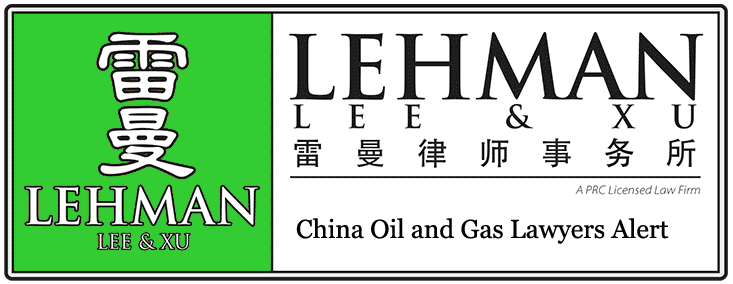
| If you would like us to send you new issues by e-mail each month, please click here to subscribe. There is no charge for this service. If not, please click here to unsubscribe (Please provide the correct Email address which you received our message or forward the message which you received to us for further process). |
 |
|
LEHMAN, LEE & XU China & Mongolian Lawyers
|
|
China Oil and Gas Lawyers Alert
|
|
May 2012
|
The China Law News keeps you on top of business, economic and political events in the China. |
|
|
|
In the News |
JV to promote cleaner coal |
SHENHUA Group Corp, China's largest coal firm, and General Electric Co yesterday opened their coal gasification joint venture to offer "cleaner coal" technology solutions in China. The 50-50 Shanghai-based venture comes under a framework they signed in November 2009 as part of Sino-US clean energy cooperation. Gasification is a technology that converts coal into synthetic gas that can then be used to produce chemicals or other products. The venture will improve the performance of commercial scale gasification and integrated gasification combined cycle (IGCC) solutions. IGCC turns coal into a gas and removes impurities from the coal gas before it is combusted. The partners didn't reveal investment details of the venture but Paul Browning, chief of GE Energy's thermal products division, said GE put all its gasification business in China in the venture. GE's gasification unit is a US$100 million business, according to him.
|
1-year power tariff plan favored |
SHANGHAI held a public hearing on its graduated power tariff mechanism for residential users yesterday, with most participants preferring a plan that uses one year as a calculation period. China has required all provinces and municipalities to introduce the progressive tariff system, which charges higher rates for heavier users, before the second half of the year. Any local plan should leave 80 percent of households unaffected. Shanghai has set a "basic needs" category of 260 kilowatts-hours a month, the average consumption of 80 percent of the city's 7.72 million households last year. Increased charges will kick in once consumption is beyond the "basic needs." City authorities have proposed several plans to implement the system. In the most-preferred one-year plan, a household pays what it currently pays for power until consumption hits 3,120 kwh (260 kwh a month times 12), and then pays higher rates during the rest of the year. This plan is considered easy to implement but it may also cause problems. For example, residents may save power at the beginning of the year so that they can use more during summer time, which may result in very heavy power load. "I'm deeply concerned about the security of the power grid if this happens," said Hu Guang, a lawyer and one of the 19 participants in yesterday's hearing. Disadvantages surface This option could cause problems in the lease market. For example, a tenant may have pricier power if he or she rents an apartment in the middle of the year. To mitigate seasonal factors, Shanghai also proposed a plan under which the basic needs figure would be raised to 350 kwh per month in July and August and in December and January when people need air-conditioning to keep cool or heating to stay warm. For the rest of the year it would be reduced to 210 kwh. But this proposal is harder to implement because manual meter reading often is delayed by several days. Also, some participants say Shanghai's basic needs category, the highest on China's mainland, is still low. "Unlike northern cities like Beijing which have heating supply in winter, we can only rely on air-conditioning," said Tao Ailian. Lou Zhe, a policewoman, said households with five people or more should be granted higher quotas for the basic category. Such households account for 17.5 percent of the city's total, she said. Huang Yingyuan, 48, said the city should also develop a system to ensure that under the graduated system 80 percent of the local households will stay unaffected in the years ahead, because overall power demand is always on the rise. At present, the city's residential power price is 0.617 yuan (about 10 US cents) per kwh, and half that at night. The higher, above-baseline rates will be the same whether the power is used during the day or night, according to government proposals.
|
|
|
|
|